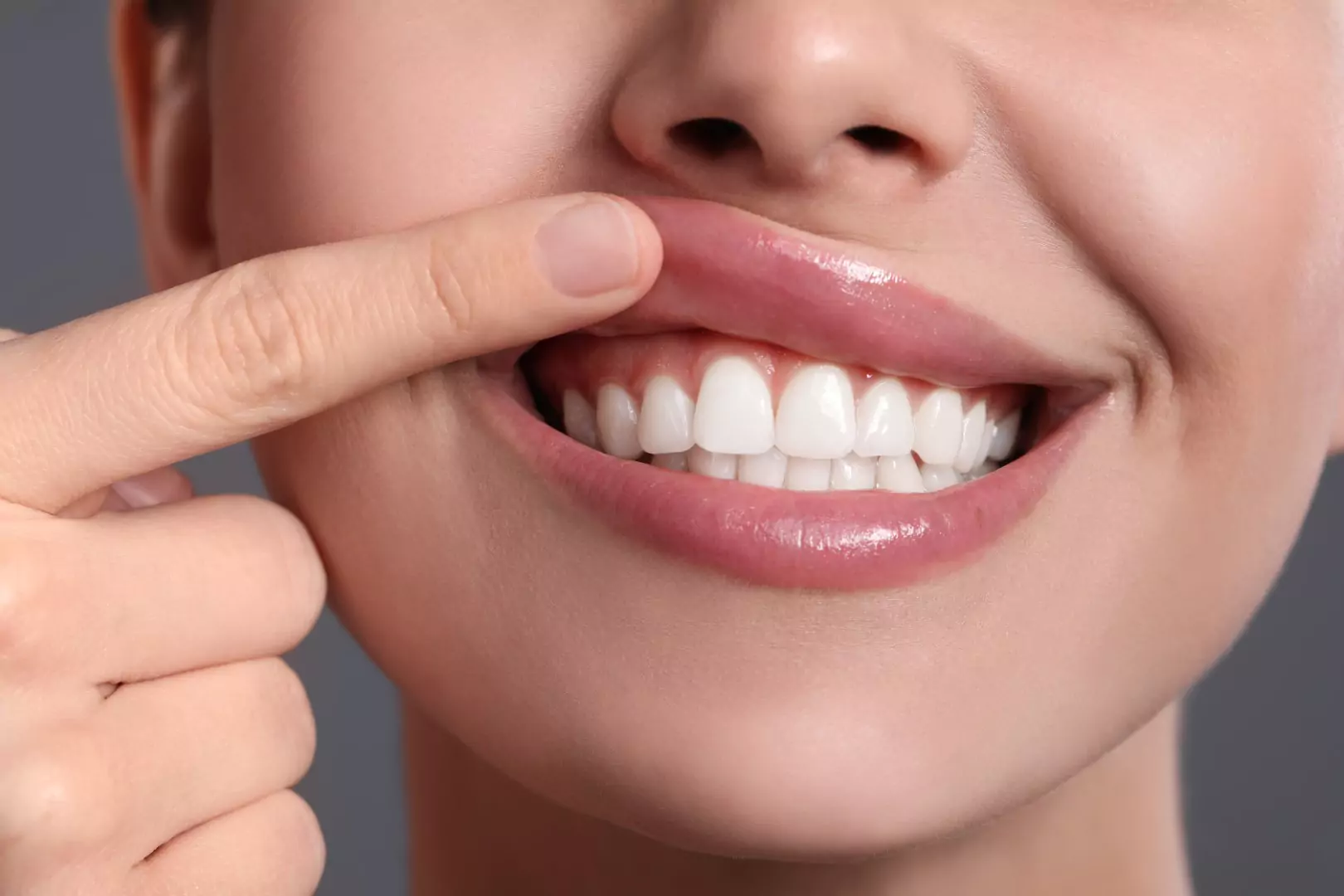Teeth Whitening is a chemical Process which whitens the basic shade of teeth from within and makes them appear whiter.
Tooth has 3 layers. Outer first layer is the translucent Enamel, second layer is yellowish dentin and third layer or the central core of the tooth which is the nerve.
It is the combination of translucency of the first layer, enamel and yellowness of the second layer, dentin which determines the colour of teeth.
In the process of Teeth Whitening, we whitens the second layer, thereby making the tooth appear more whiter

Teeth whitening is performed with a whitening/bleaching agent which is activated in the presence of a specific light/laser. Once bleaching agent is activated the process of whitening starts
1) Photographs
We start planning for teeth whitening by taking high resolution photos of your teeth and your smile. Original shade of the teeth is assessed by looking at your teeth and correlating it in the high resolution photographs along with the shade tab.
2) Teeth Cleaning and polishing
General teeth cleaning and polishing procedure is performed which will get rid of any plaque/tartar/stains on the teeth.
3) Gingival Barrier
A gum barrier is applied at the junction of teeth and gums which will limit the flow of bleaching agent only on the teeth and prevent it from touching the gums.
4) Application of bleaching agent
After protecting the gums, a bleaching agent is applied to the teeth. Depending on the degree of whitening required concentration of bleaching agent may differ. This bleaching agent is activated by a special frequency of ultraviolet light. Once the bleaching agent is activated, it starts penetrating the tooth enamel and reaches the second layer of tooth and starts whitening it. First cycle of whitening lasts for 35-40 minutes. After the first cycle if additional whitening is required, the second and third cycle can be performed.
5) Polishing of teeth
Gingival barrier is removed from the gums and final polishing is performed which gives a sparkling white new smile


Teeth whitening can only change the colour of original teeth. There will be no effect on the colour of teeth fillings and ceramic crowns.
Patients who have multiple front teeth fillings and ceramic crowns have to be assessed thoroughly before opting for any whitening procedure. In these patients other cosmetic procedures can be opted instead of teeth whitening.
Teeth whitening is not a permanent procedure, and the duration of its effects can vary from person to person. While teeth whitening can provide noticeable improvements in the brightness of your teeth, the results are influenced by various factors, and they typically do not last a lifetime. Here’s why:
1) Diet and Lifestyle: The foods and drinks you consume can stain your teeth over time. Beverages like coffee, tea, red wine, and certain foods can contribute to new stains forming on your teeth, gradually reversing the whitening effects.
2) Tobacco Use: Smoking or using tobacco products can lead to significant tooth discoloration, counteracting the results of teeth whitening.
3) Age: As you age, the natural color of your teeth can change due to factors such as thinning enamel, exposing the darker dentin layer beneath.
4) Genetics: Your genetics play a role in the natural color of your teeth. Some individuals naturally have whiter teeth, while others have teeth that are more prone to staining.
5) Oral Hygiene: Maintaining good oral hygiene practices, including regular brushing, flossing, and professional cleanings, can help prolong the effects of teeth whitening.

6) Type of Whitening Treatment: The type of teeth whitening treatment you undergo can also influence how long the effects last. In-office professional whitening treatments tend to offer longer-lasting results compared to over-the-counter whitening products.
7) At-Home Maintenance: Dentists often recommend using whitening toothpaste or maintenance kits to help extend the effects of teeth whitening. These products are designed to help minimize new stains from developing.
In general, the results of teeth whitening can last anywhere from several months to a year. Regular touch-ups and lifestyle adjustments can help you enjoy the benefits of a whiter smile for a longer period

Call Us
Mail Us

Please feel free to contact us if you have any questions about our services or to schedule an appointment.
